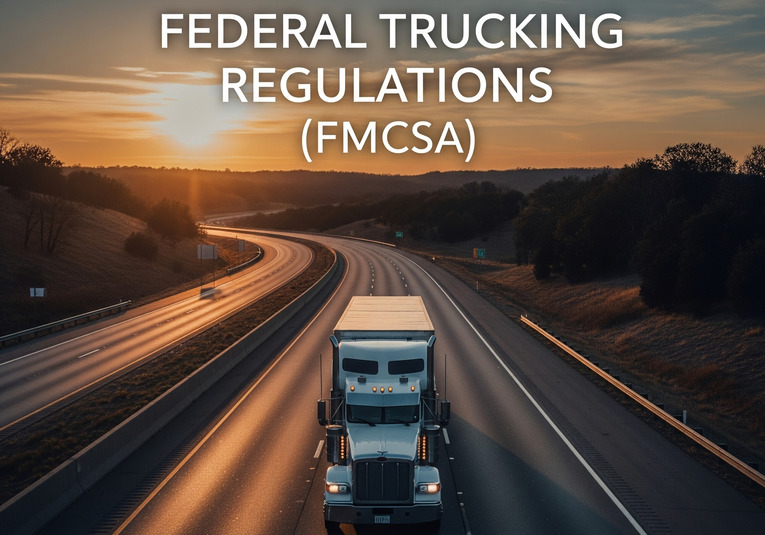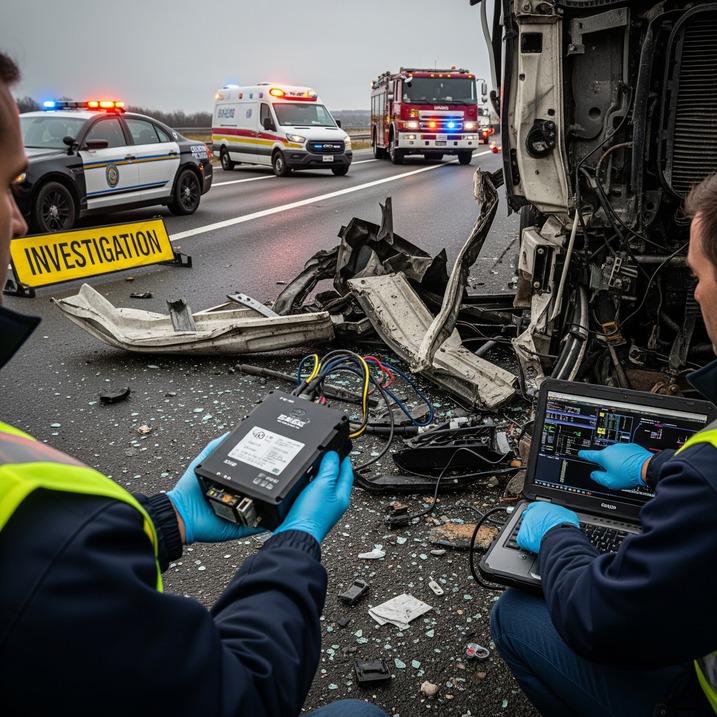Kansas City Truck Accident Lawyer
Experienced Kansas City Truck Accident Lawyers: Protecting Victims of Commercial Truck Collisions
Truck accidents can be devastating, and if you or a loved one has been involved in one in Kansas City, it’s crucial to understand your rights and options. At Injury Law Associates, our Kansas City truck accident lawyers are dedicated to helping you navigate the complex legal process. With nearly two decades of dedicated personal injury practice since 2005, our firm has a deep understanding of both federal trucking regulations and Missouri state laws, ensuring you receive the compensation you deserve, covering not only immediate medical expenses but also long-term rehabilitation costs, lost wages, and emotional distress.
The consequences of truck accidents can be severe. National statistics show there are over 15 million trucks operating in the United States. The National Highway Traffic Safety Administration reports that nearly 300,000 large trucks are involved in traffic accidents each year, resulting in over 3,000 deaths and 74,000 injuries. Most of these injuries affect passengers of other vehicles rather than the truck driver. If you or a loved one has been involved in a truck accident, an experienced Kansas City truck accident lawyer can guide you through the legal process and help you seek compensation for your losses, including property damage and loss of income.
Needing Medical Attention
If you or a loved one has been involved in a truck accident, the first step is to seek medical attention immediately. Even if you don’t think you’re injured, it’s always best to be checked by a medical professional. This ensures you receive necessary care and helps document any injuries sustained in the accident, which can be crucial for your legal case. Injuries from truck accidents can sometimes be internal or not immediately apparent, so a thorough medical examination is vital.
 Once you’ve received medical attention, it’s time to consider your legal options. If the accident was caused by the negligence of the truck driver, the trucking company, or another party, you may be entitled to compensation for your injuries and other damages. This compensation can cover medical expenses, lost wages, pain and suffering, and even future medical treatments if required.
Once you’ve received medical attention, it’s time to consider your legal options. If the accident was caused by the negligence of the truck driver, the trucking company, or another party, you may be entitled to compensation for your injuries and other damages. This compensation can cover medical expenses, lost wages, pain and suffering, and even future medical treatments if required.
The Importance of Legal Representation
The first step in pursuing a legal claim for a truck accident is to speak with a qualified Kansas City truck accident lawyer. A skilled lawyer can evaluate your case, help you understand your rights and options, and assist in gathering the necessary evidence, such as police reports, witness statements, and medical records. This evidence is vital in building a strong case to prove your claim and ensuring that all responsible parties are held accountable.
Act Quickly in a Truck Accident Case
In a truck accident case, time is of the essence. It is crucial to have an attorney work on your case as soon as possible. Trucking companies often have experts on scene within hours of a serious accident to gather information and begin building a defense. Furthermore, it is not uncommon for trucking companies and drivers to falsify logbooks or destroy evidence.
At the scene of the accident, it’s important to interview witnesses, inspect the vehicles, and document the accident scene before any evidence is lost. Without the help of an attorney, you may not have access to this crucial information. Don’t delay; contact an attorney as soon as possible after a truck accident to ensure the best possible outcome for your case. An experienced lawyer will know how to secure evidence and may work with accident reconstruction experts to strengthen your case.
What Are The Main Causes Of Truck Accidents?
Negotiating with Insurance Companies
If you decide to pursue a legal claim for your truck accident, your lawyer will likely start by negotiating with the insurance company of the trucking company or another party. However, it’s important to note that insurance companies are in the business of making money and they may try to settle your case quickly and cheaply. A skilled Kansas City wrongful death lawyer will know how to negotiate effectively and will fight to get you the compensation you deserve, including compensation for non-economic damages like emotional distress.
If the insurance company is unwilling to offer a fair settlement, your lawyer may advise you to file a lawsuit. This can be a complicated and time-consuming process, but it is sometimes necessary to get the compensation you deserve. A good lawyer will be able to guide you through the legal process and work to build a strong case on your behalf, ensuring that all deadlines are met and procedural requirements are followed.
Understanding Federal Trucking Regulations (FMCSA)

Truck accidents are often far more complex than typical car collisions due to the intricate web of federal regulations governing the commercial trucking industry. The Federal Motor Carrier Safety Administration (FMCSA) sets strict rules designed to ensure the safety of large commercial vehicles and their drivers. When these regulations are violated, it can serve as powerful evidence of negligence in a truck accident lawsuit.
Key FMCSA regulations that frequently come into play in truck accident cases include:
- Hours of Service (HOS) Regulations: To combat driver fatigue, the FMCSA mandates strict limits on how long commercial truck drivers can operate their vehicles. Violations, such as driving more than 11 hours after 10 consecutive hours off duty, or exceeding 70 hours in 8 consecutive days, are a common cause of drowsy driving accidents. Electronic Logging Devices (ELDs) track these hours, providing objective evidence of non-compliance.
- Vehicle Maintenance and Inspection Requirements: Trucking companies are legally required to keep their fleets in safe operating condition. This includes mandatory pre-trip and post-trip inspections by drivers and regular maintenance by qualified mechanics. Defects like faulty brakes, worn tires, or malfunctioning lights, if unaddressed, can lead to catastrophic failures. Maintenance logs and inspection reports are critical evidence in these cases.
- Cargo Securement Standards: Improperly loaded or unsecured cargo can shift, causing a truck to become unstable, overturn, or spill its contents onto the road. The FMCSA has specific rules on how cargo must be secured, including weight distribution and the use of tie-downs. Violations here can directly lead to loss of control accidents.
- Drug and Alcohol Testing Regulations: Commercial drivers are subject to rigorous drug and alcohol testing, including pre-employment, random, post-accident, and “reasonable suspicion” testing. A positive test or a trucking company’s failure to conduct mandated tests can indicate a serious breach of safety standards.
- Driver Qualification Requirements: Trucking companies must ensure their drivers are properly qualified, holding a valid Commercial Driver’s License (CDL), meeting minimum age requirements, passing physical fitness tests, and having a clean driving record. Negligent hiring or retention of unqualified drivers can be a direct cause of accidents.
- Accident Reporting and Investigation Procedures: The FMCSA requires prompt reporting and thorough investigation of accidents involving fatalities, injuries requiring immediate medical attention, or significant property damage. These reports can provide crucial initial details for a legal investigation.
How FMCSA Violations Impact Your Case:
When a truck driver or trucking company violates FMCSA regulations, it often constitutes “negligence per se” in a personal injury claim. This means the violation itself can be direct proof of fault, making it easier to establish liability. Our experienced Kansas City truck accident attorneys meticulously investigate compliance with these federal standards, utilizing driver logs, maintenance records, drug test results, and other critical documentation to build a strong case on your behalf.
Navigating Multi-Party Liability in Truck Accidents
Unlike typical car accidents, truck collisions frequently involve multiple potentially liable parties beyond just the truck driver. The complex commercial structure behind a semi-truck means that accountability can extend to various entities, each with their own responsibilities and insurance policies. Identifying and pursuing all negligent parties is crucial for maximizing your compensation.
Potential parties that could be held liable in a multi-party truck accident include:
- The Truck Driver: Often the most obvious party, liable for negligent driving behaviors such as speeding, distracted driving, fatigued driving (violating HOS), impaired driving, or failing to follow traffic laws.
- The Trucking Company (Motor Carrier): The employer of the truck driver can often be held vicariously liable for their driver’s negligence under legal doctrines like respondeat superior. Additionally, trucking companies can be directly liable for:
- Negligent Hiring: Employing drivers with poor driving records, insufficient training, or known substance abuse issues.
- Negligent Supervision/Training: Failing to properly train or supervise drivers, or pressuring them to meet unrealistic delivery schedules that encourage HOS violations.
- Negligent Maintenance: Failing to properly maintain their fleet, leading to mechanical failures.
- Encouraging Logbook Falsification: Pressuring drivers to falsify Electronic Logging Device (ELD) records.
- The Truck Owner (if different from the Motor Carrier): If the truck or trailer is owned by a third party and a mechanical failure or poor maintenance contributed to the crash, the owner may share responsibility.
- Cargo Loaders or Shipping Companies: If the accident resulted from improperly loaded or unsecured cargo (e.g., unbalanced load, shifting freight, cargo spill), the company responsible for loading or securing the cargo can be held liable.
- Vehicle or Parts Manufacturers: If a defect in the truck itself or one of its components (e.g., faulty brakes, defective tires, steering system) caused or contributed to the accident, the manufacturer could be held liable under product liability laws.
- Maintenance and Repair Facilities: If a third-party garage or mechanic performed negligent maintenance or repairs that led to a mechanical failure and an accident, they could be held accountable.
- Brokers: Companies that arrange for goods to be transported by third-party carriers can sometimes be liable if they negligently select a dangerous driver or carrier, or if they exert significant control over the driver’s operations.
- Government Entities: In rare cases, a government agency responsible for road design, construction, or maintenance could be partially liable if unsafe road conditions (e.g., poorly marked lanes, missing signs, unrepaired potholes) directly contributed to the accident.
The Role of Comparative Fault:
Missouri operates under a pure comparative fault system. This means that even if you are found to be partially at fault for an accident, you can still recover damages, though your compensation will be reduced by your percentage of fault. Identifying all liable parties is critical in these scenarios, as it allows for a more comprehensive claim and can increase the total compensation available to you. Our legal team conducts exhaustive investigations to uncover every party that contributed to your truck accident, ensuring maximum accountability.
The Role of Black Box Data in Truck Accident Investigations

In the aftermath of a devastating truck accident, piecing together precisely what happened is crucial for establishing liability. One of the most invaluable and objective sources of information is the “black box” – formally known as an Event Data Recorder (EDR) or the data from Electronic Logging Devices (ELDs) – embedded in most commercial trucks. Much like the black boxes in airplanes, these devices record critical operational data that can be instrumental in reconstructing the moments leading up to a collision.
What Data Does a Truck’s Black Box Record?
While the exact data points can vary by truck make and model, a truck’s black box system typically logs a wide range of parameters, including:
- Speed: Exact vehicle speed in the seconds before, during, and after impact.
- Braking: When and how forcefully brakes were applied, including hard braking events.
- Throttle Position: Data on engine RPM and accelerator pedal usage.
- Steering Angle: Information on steering wheel movements, indicating sudden evasive maneuvers or loss of control.
- Hours of Service (HOS): Records of driving time, rest periods, and duty status, directly from the ELD, to confirm compliance with fatigue regulations.
- Cruise Control Status: Whether cruise control was engaged.
- Seatbelt Usage: Whether the driver’s seatbelt was buckled.
- Mechanical Faults/Warnings: Alerts for any mechanical issues, system malfunctions, or diagnostic trouble codes.
- Impact Force: Data on the severity and direction of impact.
How Black Box Data is Used in Investigations:
- Accident Reconstruction: The data provides a precise timeline of events, allowing accident reconstruction experts to recreate the collision sequence. This can reveal crucial details like impact speed, point of impact, and evasive actions (or lack thereof).
- Proving Negligence: If the data shows the driver was speeding, braking improperly, driving beyond HOS limits, or making erratic maneuvers, it serves as strong objective evidence of negligence.
- Contradicting False Statements: Black box data offers an unbiased account that can disprove false claims made by the driver or trucking company regarding their actions or the vehicle’s condition.
- Identifying Mechanical Failures: If the data indicates system warnings or malfunctions prior to the crash, it can point to negligent maintenance or a defective part, potentially shifting liability to the trucking company or manufacturer.
- Strengthening Legal Claims: For victims, this objective data significantly strengthens claims for compensation by providing clear evidence of fault, making it harder for insurance companies to dispute liability or minimize settlements.
Preserving This Crucial Evidence:
Trucking companies are often legally required to retain black box data, but for a limited time. It is imperative to act quickly after a truck accident. An experienced attorney will issue a spoliation letter (or preservation letter) to the trucking company, legally compelling them to preserve all relevant data, including black box information, maintenance records, and driver logs. Without prompt action, this vital evidence can be lost or overwritten, severely impacting your ability to build a strong case.
Seek Legal Guidance from Our Kansas City Truck Accident Lawyer
It’s important to remember that every truck accident case is unique, and the outcome will depend on the specific facts and circumstances of your case. However, if you or a loved one has been involved in a truck accident in Kansas City, it’s crucial to understand your rights and options. With the help of a qualified truck accident lawyer, you may be able to recover compensation for your injuries and other damages. Don’t wait; contact us today to ensure your rights are protected and to start your journey toward recovery. An initial consultation can provide clarity on the next steps and what to expect from the legal process.
